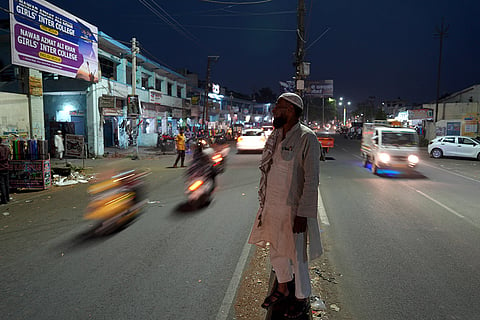Children wait at the gate of a mosque that houses a madrasa at a basti where those displaced after the 2013 Muzaffarnagar riots have been living
Waqf Bill: Fear, Anger, Disbelief in Western UP
A visit to Muzaffarnagar, Deoband and Saharanpur—prominent cities in Western UP—reveals that several rumours pertaining to the Waqf Law are floating around. While some say the amendments are a ploy to snatch lands and properties owned by Muslims and hand them over to the government and corporates, the others say the passing of the Bill is an excuse to interfere with the religious practices of Muslims and is an attempt to fan the Hindu-Muslim fire ahead of the 2027 state elections. Snapshots from the ground

Madrasa Mazahir Uloom at Saharanpur

Mujeeb Shibli, the caretaker of Ayesha Mosque, Muzaffarnagar, shows the notice he got from the city magistrate for “disrupting peace”. The notice was sent to 300 others who offered namaz at Ayesha Mosque wearing black bands to protest against the Waqf Bill

Mohammad Mosin with the other survivors of the 2013 Muzaffarnagar riots

Shops on the entire stretch at Meenakshi Chowk in Muzaffarnagar are built on Waqf property. They have been paying nominal rent for years

A shopkeeper shows the rent receipt he receives from Waqf. In an unusual move, the owners of the sixty-year-old Nagina building in Saharanpur have lent the shops on the premises to Hindu shopkeepers

Shops in and around the Jama Masjid in Saharanpur are built on Waqf property

Students studying in the library of Madrasa Mazahir Uloom, Saharanpur, that houses thousands of books

Student prepare for their entrance exam at Madrasa Mazahir Uloom, Saharanpur

Students waiting outside Darul Uloom in Deoband

Women in burqa in Muzzafarnagar

A religious procession is underway on the Meerut-Muzaffarnagar Highway